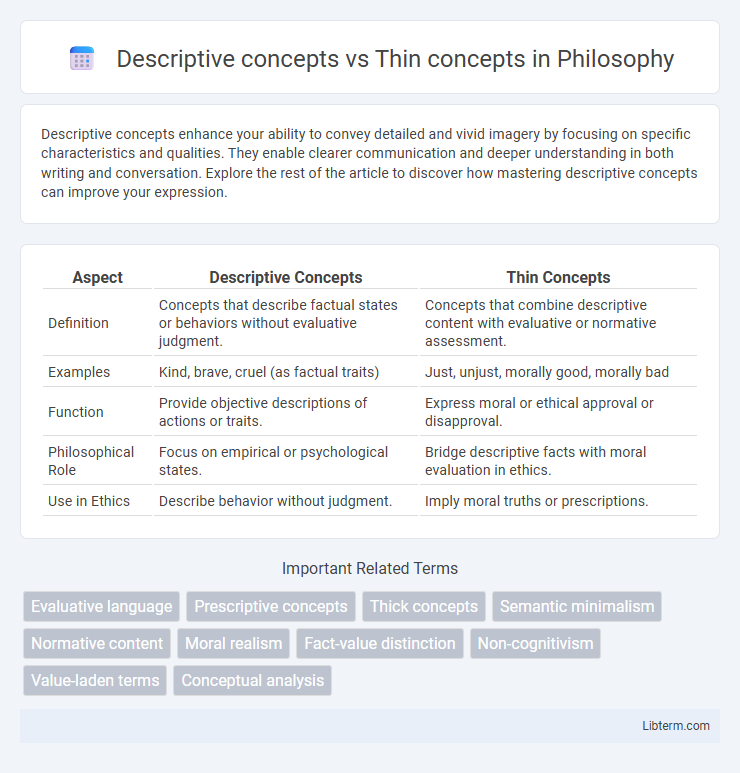Descriptive concepts enhance your ability to convey detailed and vivid imagery by focusing on specific characteristics and qualities. They enable clearer communication and deeper understanding in both writing and conversation. Explore the rest of the article to discover how mastering descriptive concepts can improve your expression.
Table of Comparison
| Aspect | Descriptive Concepts | Thin Concepts |
|---|---|---|
| Definition | Concepts that describe factual states or behaviors without evaluative judgment. | Concepts that combine descriptive content with evaluative or normative assessment. |
| Examples | Kind, brave, cruel (as factual traits) | Just, unjust, morally good, morally bad |
| Function | Provide objective descriptions of actions or traits. | Express moral or ethical approval or disapproval. |
| Philosophical Role | Focus on empirical or psychological states. | Bridge descriptive facts with moral evaluation in ethics. |
| Use in Ethics | Describe behavior without judgment. | Imply moral truths or prescriptions. |
Introduction to Descriptive and Thin Concepts
Descriptive concepts are defined by empirical features and factual content that can be observed and tested, primarily guiding our understanding of the world through objective criteria. Thin concepts, in contrast, encapsulate minimal descriptive content but carry significant evaluative or normative weight, often used in moral and aesthetic judgments. The distinction helps clarify how language functions in conveying factual information versus expressing ethical or emotional evaluations.
Defining Descriptive Concepts
Descriptive concepts are cognitive tools used to categorize and characterize objects or ideas based on observable features and factual information, such as "water" being defined by its chemical composition H2O. They function primarily in empirical contexts where accurate representation of reality is essential, unlike thin concepts which are often evaluative or morally charged, like "good" or "bad." Defining descriptive concepts involves outlining clear, objective criteria that capture the essence and distinctive properties of the referent without embedding subjective judgments.
Understanding Thin Concepts
Thin concepts refer to basic evaluative terms such as "good" and "bad," which provide minimal descriptive content but convey essential moral judgments. Unlike descriptive concepts that offer detailed factual information, thin concepts function primarily to express approval or disapproval in ethical discourse. Understanding thin concepts is crucial for analyzing moral reasoning since they shape normative evaluations without extensive empirical detail.
Key Differences Between Descriptive and Thin Concepts
Descriptive concepts provide detailed, empirical information about objects or phenomena, emphasizing observable characteristics and factual content. Thin concepts, conversely, encapsulate minimal evaluative or normative judgment, often serving as fundamental moral or philosophical terms like "good" or "bad" with low descriptive content. The key differences lie in their complexity and function: descriptive concepts convey rich, concrete data, while thin concepts express basic evaluative stances with minimal descriptive detail.
Philosophical Perspectives on Concept Classification
Descriptive concepts in philosophy refer to those grounded in empirical observation and factual content, providing objective criteria for classification, whereas thin concepts involve ethical or evaluative judgments with minimal descriptive content, often expressing approval or disapproval. Thin concepts like "good" and "bad" are central to normative ethics, embodying evaluative perspectives that resist purely empirical verification. Philosophical perspectives on concept classification emphasize the distinct roles these types play in shaping moral reasoning and ontological analysis, highlighting the challenge of integrating normative significance with factual descriptions.
The Role of Context in Meaning
Descriptive concepts provide detailed information that is context-independent, allowing for stable meaning across different situations. Thin concepts, however, derive much of their meaning from the context, often relying on social, cultural, or situational cues to convey significance. The role of context is crucial in thin concepts as it shapes understanding and interpretation, highlighting the flexible and dynamic nature of meaning in various communicative environments.
Examples of Descriptive Concepts in Everyday Language
Descriptive concepts in everyday language include terms like "apple," "chair," and "dog," which convey specific sensory or physical attributes. These concepts are grounded in empirical observation and provide concrete information about objects or experiences. Unlike thin concepts, which often carry evaluative or moral significance, descriptive concepts primarily offer factual descriptions that facilitate clear communication.
Examples of Thin Concepts in Moral Discourse
Thin concepts in moral discourse, such as "good," "bad," "right," and "wrong," serve as fundamental evaluative terms that convey broad moral judgments without detailed descriptive content. These concepts are contrasted with descriptive concepts, which provide specific information about actions or situations, like "painful" or "complex." Thin concepts function as essential tools for ethical evaluation by encapsulating approval or disapproval in a concise manner, making them pivotal in moral reasoning and dialogue.
Debates and Challenges in Distinguishing Concepts
Debates surrounding descriptive versus thin concepts focus on the challenge of differentiating concepts grounded in factual or empirical content from those primarily evaluative or normative in nature. Thin concepts, such as justice or cruelty, embody both descriptive and evaluative elements, complicating efforts to isolate their purely descriptive components. Philosophers and cognitive scientists grapple with whether conceptual distinctions require clear-cut boundaries or accept overlapping characteristics, impacting the analysis of moral philosophy and semantics.
Implications for Ethics and Philosophy
Descriptive concepts, grounded in empirical observation, provide specific information about the world, while thin concepts like "good" or "wrong" express evaluative judgments with minimal descriptive content. This distinction has crucial implications for ethics and philosophy, as it challenges the objectivity of moral claims and raises questions about the relationship between facts and values. Understanding the difference can aid in clarifying ethical debates and in analyzing how moral language functions in philosophical discourse.
Descriptive concepts Infographic

 libterm.com
libterm.com